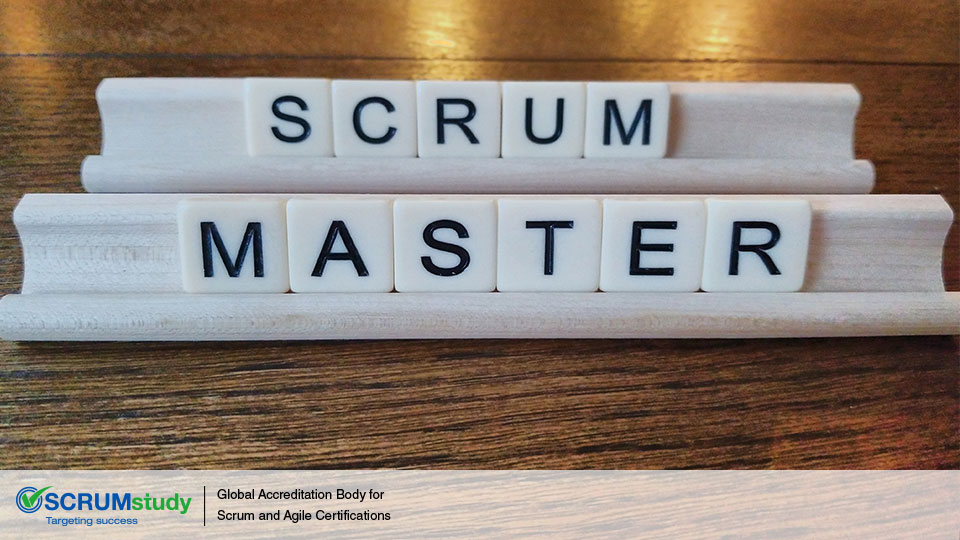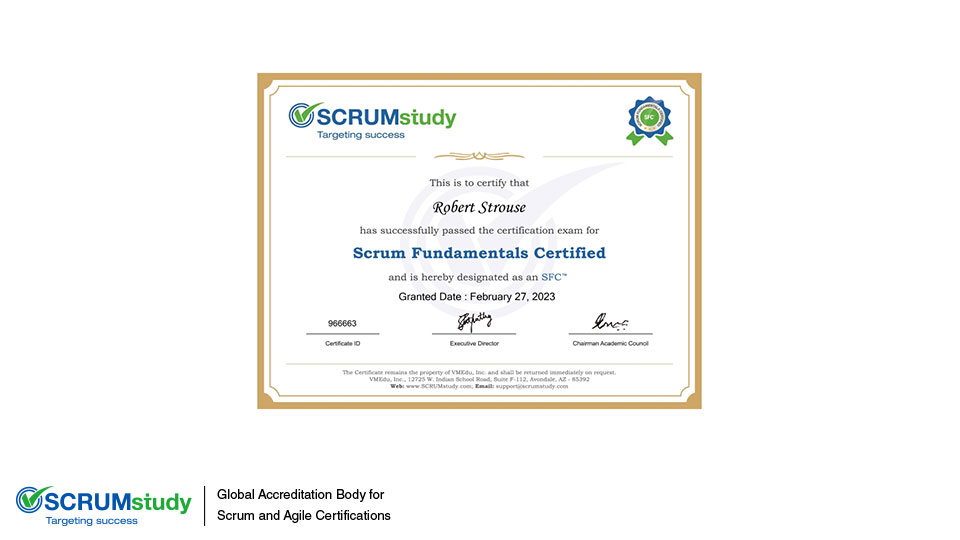What is the primary role of a Scrum Master in a Scrum team?
Posted by SCRUMstudy® on July 11, 2024
Categories: Agile Certification Scaling Scrum Scrum Training
The Scrum Master is a crucial role within the Scrum framework, responsible for ensuring that the team adheres to Scrum practices and principles. Acting as a facilitator and coach, the Scrum Master helps remove impediments that could hinder the team's progress, fosters an environment of collaboration and continuous improvement, and protects the team from external interruptions. They guide the team through Scrum ceremonies, such as sprint planning, daily stand-ups, sprint reviews, and retrospectives, ensuring that these meetings are productive and focused.
To adopt the Scrum framework correctly and produce the outcomes the organizations require, they need to have an expert on the team — The Scrum Master!
A Scrum Master’s position in an organization is relatively limited in scope, yet quite broad in terms of influence. However, in practice, a Scrum Master is not directly involved in product strategy. Working behind the scenes, he/she acts as a connecting link between the Product Owner and the Scrum development team. The Scrum Master role is very different from the role played by the Project Manager in a traditional Waterfall model of project management, in which the Project Manager works as a manager or leader for the project, but the Scrum Master only works as a facilitator. So, let’s take a closer look at the many roles and responsibilities of a Scrum Master.
A Scrum Master:
- is the “supporting leader” of the Scrum Team who moderates and facilitates team interactions as team coach and motivator.
- is responsible for ensuring that the team has a productive work environment by guarding the team from external influences, removing any obstacles.
- is responsible for enforcing Scrum principles, aspects, and processes.
- is at the same hierarchical level as anyone else in the Scrum Team—any person from the Scrum Team who learns how to facilitate Scrum projects can become the Scrum Master for a project or for a Sprint.
- facilitates selection of the Scrum Team and creation of the Collaboration Plan and the Team Building Plan.
- determines length of Sprint with the Scrum team and implements essential steps to maximize the team’s productivity.
- facilitates the Scrum Team in creating the Task List for the next Sprint.
- assists the Scrum Team in estimating the effort required to complete the tasks agreed to for the Sprint.
- supports the Scrum Team in creating the Deliverables agreed to for the Sprint.
- facilitates presentation of completed Deliverables by the Scrum Team for the Product Owner’s approval.
- represents the Scrum Core Team to provide lessons from the current project, if necessary.
An effective Scrum Master helps the team to understand and optimize technical and organizational dependencies while guarding the team from external influences. He/she lines up the required resources with transparency. This helps teams to commit to deadlines while creating a culture of accountability.
By serving as a bridge between the Product Owner and the Development Team, the Scrum Master ensures that communication is clear and that the team remains aligned with the project's goals, ultimately enhancing productivity and the quality of deliverables.
What is the role of a Scrum Master in facilitating collaboration between development and operations teams?
Posted by SCRUMstudy® on June 28, 2024
Categories: Agile Certification Scrum Scrum Guide Scrum Principles Training
The SBOK™ Guide (Scrum Body of Knowledge) outlines the principles and processes of Scrum, providing a comprehensive framework for implementing Agile practices effectively. Within the context of Operations and DevOps, the guide highlights the importance of continuous integration, continuous delivery, and operational efficiency, crucial for maintaining and improving software systems post-deployment. Certification renewal in these domains ensures that professionals remain updated with the latest methodologies, tools, and practices, fostering a culture of ongoing improvement and adaptability. This renewal process typically involves engaging in continuing education, attending relevant workshops, and staying informed about emerging trends and technologies, thereby ensuring that certified individuals can effectively contribute to and lead their teams in dynamic and complex operational environments.
Extending Scrum to operations and DevOps enables organizations to strive for continuous improvement and innovation, ultimately improving their capacity to meet market demands and deliver customer value. In this era of rapid software deployment and continuous integration, the convergence of development and operations teams within an organization, commonly referred to as DevOps, has gained prominence.
To effectively manage this convergence, many organizations are turning to agile frameworks for a solution. The Scrum/Agile framework, with its iterative, collaborative, and customer-focused approach, is a comprehensive solution that addresses the challenges being faced by this integration.
Scrum for Operations and DevOps combined are relevant to professionals who are keen on fostering a culture of continuous improvement, enhancing collaboration, and achieving faster delivery cycles.
Many organizations have opted to combine Dev and Ops functions, aka DevOps, to integrate development and operational support activities while leveraging an Agile/Scrum framework.
What values should be emphasized in a Scrum Master training program to ensure that participants effectively embody the role of a Scrum Master in fostering team collaboration, removing impediments, and driving continuous improvement?
Posted by SCRUMstudy® on May 30, 2024
Categories: Agile Certification SBOK® Guide Scrum Scrum Guide Scrum Master Training
In a Scrum Master training program, emphasizing values such as servant leadership, empathy, and adaptability is crucial for effective role embodiment. Participants should be trained to lead by example, focusing on the needs of the team and prioritizing their growth and success over personal accolades. Empathy enables Scrum Masters to understand and address team members' concerns, fostering a supportive environment that encourages open communication and collaboration. Adaptability is also key, as Scrum Masters must be agile in responding to changing circumstances and continuously evolving their approach to problem-solving and process improvement. By instilling these values, the training program ensures that Scrum Masters are well-equipped to facilitate effective teamwork, remove impediments efficiently, and drive ongoing enhancements within the team and the organization.
We will attempt to do a quick overview of some of the Scrum certifications that are currently being offered.
Next, let's discuss how to choose the right Scrum trainer. While it can be beneficial to find a Scrum trainer with a similar background to yours, it is not an absolute requirement. The framework and style of Scrum training can vary from trainer to trainer, so it's important to find one that matches your learning style.
The biggest positive of a formal Scrum training is that you learn everything in a controlled environment. You meet people who are also there to learn about Scrum and in case you have common background, it helps to understand the process and difficulties of implementation from outsider’s point of view. A formal training also helps you understand about the mistake which you may make due to the traditional project management concepts rooted in you.
The main purpose of any certification is to impart a common baseline of the knowledge. These Scrum certifications, compared to any other project management certifications have a very easy test. You should remember that getting a Scrum certificate is way easier than the implementing actual Scrum framework.
Scrum and Agile methodologies offer significant flexibility in implementation. However, it's crucial to maintain the core principles of the process. Project managers who modify essential elements of Scrum are often referred to as "Scrumbut." It is generally recommended to adopt Scrum in its entirety initially to fully understand its mechanics. Once you have a solid grasp of the framework, you can then make informed decisions about potential adjustments. Over time, you may realize that no changes are necessary.
You need to understand that nothing is more valuable than experience. Scrum or Agile Certification may only add some credibility and marketability to the individual.
How can the role of a Scrum Master enhance team productivity and project success?
Posted by SCRUMstudy® on December 13, 2023
Categories: Agile Certification Scrum Training
In the fast-paced realm of project management, mastering Scrum methodologies is crucial for efficient team collaboration and project success. Scrum Master seminars offer invaluable opportunities for professionals to deepen their understanding and hone their skills in leading Agile teams.
Comprehensive Curriculum
Scrum Master seminars cover a comprehensive curriculum designed to equip participants with the knowledge of Scrum principles, roles, and practices. From sprint planning and daily stand-ups to sprint reviews and retrospectives, every aspect of the Scrum framework is meticulously explored.
Interactive Learning Environment
These seminars provide an interactive learning environment where participants engage in practical exercises, case studies, and discussions. This hands-on approach ensures that attendees not only grasp theoretical concepts but also gain practical insights into applying Scrum methodologies effectively in diverse project scenarios.
Certification Preparation
Moreover, Scrum Master seminars prepare attendees for certification exams, such as the Scrum Master Certified (SMC) certification, validating their expertise and enhancing their professional credentials in Agile project management.
Networking Opportunities
Beyond education, these seminars facilitate networking among like-minded professionals, fostering collaboration and the exchange of best practices in Agile project management.
Role of a Scrum Master
Posted by SCRUMstudy® on February 19, 2023
Categories: Agile Product Owner Scrum Scrum Master Scrum Team
The first thing that we need to figure out while dealing with Scrum master is whether they are full time Scrum masters, and the second question tends to what exactly their task is.
We usually don’t find a full time scrum master. Scrum master, as described by scrum guide is the one who teaches, facilitates and removes impediments. When the team is relatively new it takes time and the team follows scrum religiously. This is when the team needs a scrum master who can teach scrum full time.
Facilitating is necessary, though it takes only 20 to 30 % of the time. The issues tend to lessen as the team learns to resolve them.
If a person puts 100% of his efforts being a scrum master, i.e. if he is training, facilitating that takes up only 20 to 25% of his time. Henec, he has to devote himself in helping the team with their work.
The first step is to train the project managers in Agile which is trying to get them to be certified scrum masters, and agile project managers, preferably from Project Management Institute.
Thus the project managers become the first scrum masters. At first the scrum master shouldn’t be assigned to one team.
Probably assign two to three teams to one project managers. Their role is to train the team in Scrum.
This has to be followed for the initial six months, until the team gets used to the concept of Scrum.
Then once you are past the first 6 to 9 months have one of the team members to be a scrum master, it would be ideal if the team was allowed to select the scrum master from their team.
Then elevate the project manager to the level of program manager. This would enable them to become accountable for cross team initiatives,
Rearrange management structure, now as the roles have been altered. Instead of a functional manager we have a delivery manager.
The delivery manager is now accountable for training agile.
Thus Scrum Masters was underway as a position and evolved to be a role as the team becomes more mature in adapting Agile.
The bottom line here is we have less people doing same amount of work. This is without the need of a dedicated scrum master, as we just need to have a contingent plan altogether.



